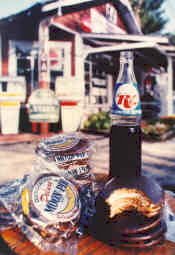Before I became a missionary I served as a pastor for eight years at a church in the western part of Kentucky at the confluence of the Ohio and Mississippi Rivers. That area is a hunter’s paradise, containing an abundance of ducks, geese, and quail. I have never liked the idea of sitting and waiting for something to fly by me, especially in cold weather, so I did not try hunting ducks and geese there, but I did try hunting quail. When people go quail hunting they do not stay in one place; instead, they constantly walk and follow bird dogs.
I went quail hunting a couple of times with a deacon in my church who owned some great hunting dogs. It was a thrilling sight to see the dogs pointing and then to hear the sound of the covey of quail taking flight after they were flushed from their hiding place. The deacon had somehow obtained a dog named Jake who had great bloodlines but simply no interest in hunting quail. I had two young sons at the time, and the deacon knew that my sons would like to have a dog for a pet, so he gave us the beautiful English setter.
Jake was a friendly dog, and he good-naturedly allowed the boys to play with him. As a pet he only had one flaw: He enjoyed barking—a natural behavior for a dog. At night I would put him in our large storage room so the neighbors could sleep, but I was concerned he would disturb them during the daylight hours.
I later bought a device I thought would solve the problem, and I took it home with an expectation of success. Jake did not have any choice on whether or not he would wear the device. It fit around his neck; he could not remove it. Whenever he barked the device was supposed to emit an irritating noise. Theoretically, the dog would connect the barking with the irritating noise and “decide” to stop barking. After I put the device around Jake’s neck, I left him in the back yard and watched with great anticipation from the house.
Not surprisingly, Jake quickly found things at which to bark. The device at times did make noise when he barked, and at first his ears “pricked up” at those times, but his natural behavior did not change. He eventually began to ignore the device, and soon after he became hardened so that he did not notice the unnatural noise at all. Therefore, I took off the device and never used it again. (I do not know why the device did not affect Jake’s behavior; perhaps I did not calibrate it correctly, or maybe he just decided to resist it.)
Each human is born with a functioning conscience, but as was probably the case with Jake’s device, the conscience becomes improperly “calibrated.” A person’s innate depravity corrupts the conscience, but there are also outside influences which corrupt the conscience. For example, perhaps because of false religious teaching, some people think it is wrong to kill any living animal, and their conscience bothers them even if they kill something as small as a mosquito.
Our missionary team in South Korea witnessed to fishermen who felt guilty about catching (killing) fish. The consciences of such people are not functioning properly. At certain times, however, God in a sense activates and properly calibrates “conviction devices” (the conscience and the will) on some non-Christians and thus temporarily places them in a freewill state by counteracting their depravity. At those times (special conviction events) those non-Christians have true free will to accept or reject His offer of salvation.
What does the Bible say about conviction? The Bible says the Holy Spirit does the convicting:
"But I tell you the truth, it is to your advantage that I go away; for if I do not go away, the Helper shall not come to you; but if I go, I will send Him to you. And He, when He comes, will convict the world concerning sin, and righteousness, and judgment; concerning sin, because they do not believe in Me; and concerning righteousness, because I go to the Father, and you no longer behold Me; and concerning judgment, because the ruler of this world has been judged" (John 16:7-11).
The “Helper” is the Holy Spirit who helps those who “do not believe” during the time of conviction. The Greek word for “Helper” (paráklētos) can also be translated as “Advisor” or “Counselor.” He helps the non-Christians clearly understand God’s righteous standard during the time of conviction. The non-Christians then understand that they are sinners who “fall short of the glory of God” (Romans 3:23). They also understand that only Jesus could meet God’s perfect standard. At this time the non-Christians can objectively look at their own sins in comparison with Christ’s righteousness. The Greek word for “convict” (elégchō) means “to expose as guilty” or “to convince.” Thus, the non-Christians under conviction are convinced of the truth in regard to their guilt.
The Bible says the gospel presentation occurs with power: “For I am not ashamed of the gospel, for it is the power of God for salvation to everyone who believes, to the Jew first and also to the Greek” (Romans 1:16).
Robert H. Mounce, president emeritus of Whitworth College, Spokane, Washington, commented on verse 16:
"The gospel serves the eternal purposes of God, who before the creation of the world chose to create for himself a people who would respond to his love. Becoming a child of God requires deliverance from what we are as children of Adam. It is not something we can do for ourselves. It requires the power of God himself working through the gospel. The gospel does not negate a person’s free will but is God’s power for 'everyone who believes.' God does not force himself upon people against their will. For the power of the gospel to effect salvation, the hearer must respond in faith. Our faith is in no way meritorious, but without faith there can be no individual salvation."
Robert H. Mounce, “Romans,” The New American Commentary, ed. E. Ray Clendenen, vol. 27 (Nashville, Tennessee: Broadman & Holman Publishers, 1995), 71.
The power of the gospel presentation is also described in 1 Thessalonians 1:5: “For our gospel did not come to you in word only, but also in power and in the Holy Spirit and with full conviction; just as you know what kind of men we proved to be among you for your sake.” This type of spiritual power is necessary to counteract the effects of total depravity on the human will. The human will is put in a freewill state when the power is applied.
The Bible says the proper response to the Holy Spirit’s special conviction is the willingness to surrender one's life to Christ in repentance and faith. As Southern Baptists we believe that a special act of the Holy Spirit is necessary for salvation. Our current confession of faith, the 2000 Baptist Faith and Message, contains a description with which both five-point Calvinists and non-five-point Calvinists can agree: “Regeneration, or the new birth, is a work of God’s grace whereby believers become new creatures in Christ Jesus. It is a change of heart wrought by the Holy Spirit through conviction of sin, to which the sinner responds in repentance toward God and faith in the Lord Jesus Christ.” In this case a non-five-point Calvinist would say the sinner’s response is to “conviction of sin,” and the five-point Calvinist would say the sinner’s response is to the “change of heart wrought by the Holy Spirit.” The 1925 Baptist Faith and Message has a description of regeneration that is unacceptable to five-point Calvinists because it says that faith is a requirement for regeneration: “Regeneration or the new birth is a change of heart wrought by the Holy Spirit, whereby we become partakers of the divine nature and a holy disposition is given, leading to the love and practice of righteousness. It is a work of God's free grace conditioned upon faith in Christ and made manifest by the fruit which we bring forth to the glory of God.” Notice in the 1925 version that regeneration is “wrought by the Holy Spirit” but is “conditioned upon faith in Christ.” Thus, in logical order, faith precedes regeneration in the 1925 version, an order that conflicts with the order espoused by five-point Calvinists. I'm not a five-point Calvinist, but I think our current confession has a good description of salvation. Isn't it nice that Southern Baptists of the five-point Calvinist variety can cooperate fully with Southern Baptists of the non-five-point Calvinist variety in evangelism?




